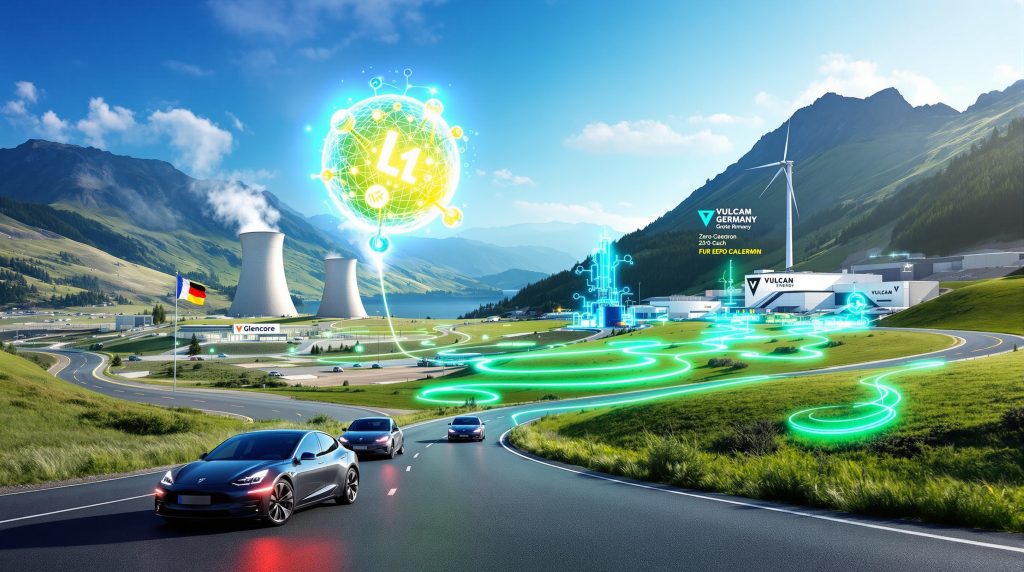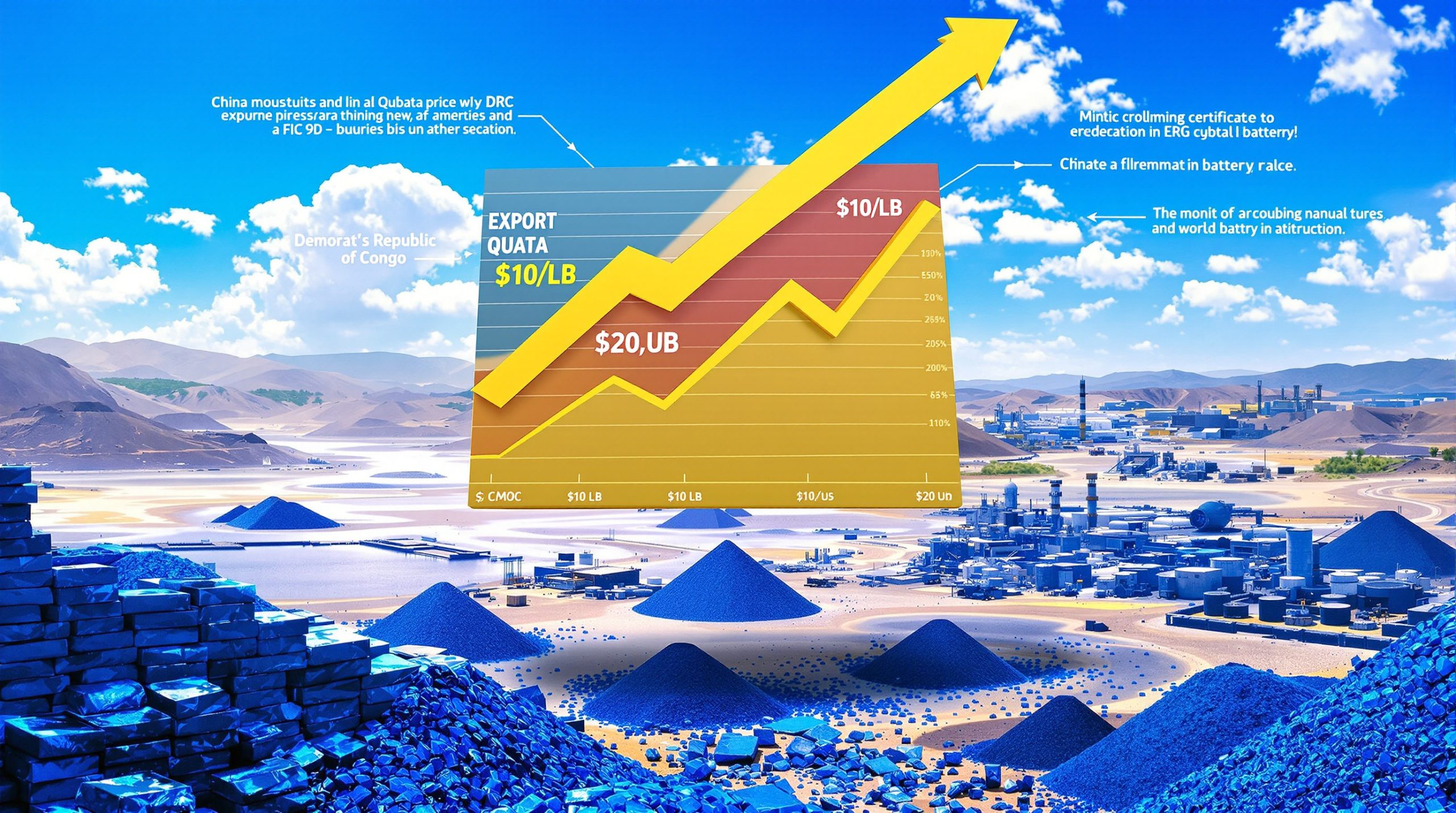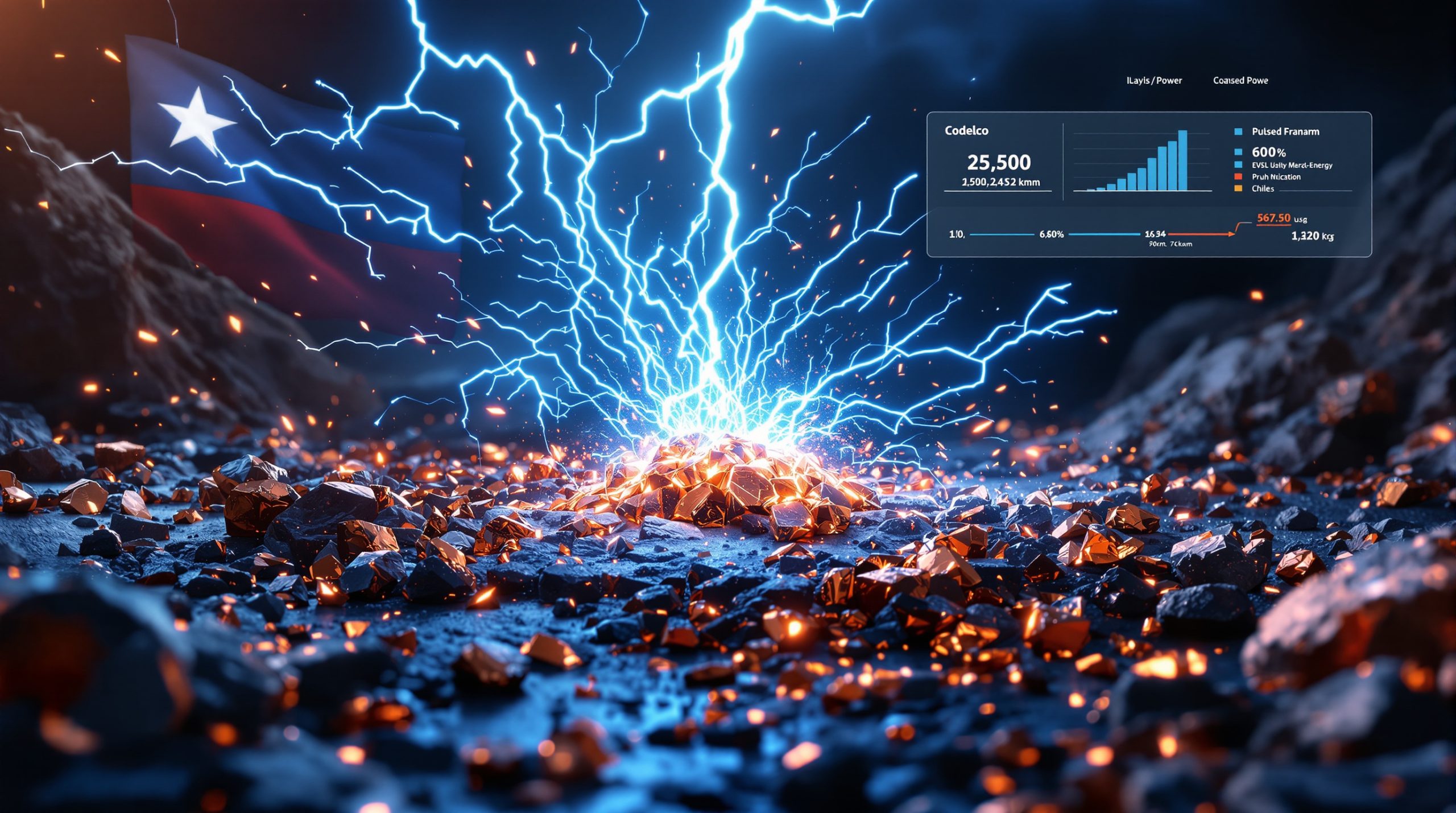Vulcan Energy's Strategic Lithium Supply Agreement with Glencore: Implications for European EV Supply Chain
Europe's lithium landscape is undergoing a significant transformation with the recent announcement of a landmark agreement between Vulcan Energy and Glencore. This partnership represents a pivotal moment in the development of Europe's battery supply chain, particularly as the continent races to establish domestic production capabilities for electric vehicle (EV) materials.
What is the Vulcan-Glencore Lithium Supply Agreement?
The recently announced agreement positions Glencore to receive between 36,000 and 44,000 tonnes of lithium hydroxide monohydrate (LHM) from Vulcan Energy's Lionheart project over an initial eight-year period. This volume represents approximately 20% of Vulcan's planned production capacity, making it a significant commercial arrangement for both parties.
Key Terms of the Landmark Deal
The agreement specifies the supply of battery-grade lithium hydroxide monohydrate, a critical component for high-performance EV batteries. This specification is particularly important as battery manufacturers have stringent quality requirements that must be met consistently.
This deal completes Vulcan's required offtake agreements needed to secure Phase 1 financing of the Lionheart project, representing a crucial milestone in the project's development timeline.
The contract structure provides Vulcan with a guaranteed market for a substantial portion of its planned production, while giving Glencore access to a strategically important battery material.
Strategic Significance for Both Companies
For Glencore, this agreement marks a strategic expansion of their battery materials portfolio beyond their traditional strengths in cobalt and nickel. As the critical minerals energy transition accelerates, Glencore is positioning itself as a more comprehensive supplier of critical battery materials.
From Vulcan's perspective, securing an agreement with a major global commodities trader strengthens their commercial position significantly. This partnership not only provides a stable revenue stream crucial for project financing but also validates their production approach and market strategy.
The CEO and Managing Director of Vulcan Energy, Cris Moreno, highlighted the strategic balance achieved through their offtake agreements: "Vulcan has now achieved a good mix of offtake partners for Phase 1 lithium production: an automaker, a battery maker, a cathode manufacturer, and a commodities trader, all with a strong European focus."
For the European battery supply chain, this agreement represents another building block in establishing regional security of supply, reducing dependency on imported materials from Asia, Australia, and South America.
How Does the Lionheart Project Transform European Lithium Supply?
The Lionheart project stands at the forefront of Europe's efforts to develop domestic lithium production capabilities, addressing a critical gap in the continent's battery supply chain.
Europe's Largest Lithium Resource
Strategically located at the French-German border, the Lionheart project is positioned as the largest lithium resource in Europe. This location places it at the heart of Europe's industrial manufacturing regions, minimizing transportation distances to battery and automotive manufacturing facilities.
The project's approach to lithium production differs significantly from conventional mining operations. Rather than hard rock mining or evaporation ponds, Vulcan will extract lithium from geothermal brines, a method that offers substantial environmental advantages.
When fully operational, the project is expected to produce sufficient lithium to support the production of approximately 500,000 electric vehicles annually. This represents a meaningful contribution to Europe's lithium requirements, though additional sources will still be needed to meet projected demand.
Sustainable Extraction Technology
The Lionheart project's environmental profile is enhanced by its integration of lithium production with geothermal lithium extraction technology. This dual-purpose approach enables the project to utilize renewable geothermal energy to power the lithium extraction process, creating a pathway to zero-carbon lithium production.
The direct lithium extraction (DLE) technology employed by Vulcan allows for a more efficient recovery of lithium from brines compared to traditional evaporation methods. This technology operates in a closed-loop system that minimizes water consumption and reduces the environmental footprint compared to conventional lithium production methods.
The process substantially reduces land requirements compared to traditional lithium mining or solar evaporation operations. While solar evaporation ponds can occupy thousands of hectares, DLE facilities require only a fraction of this land area.
The carbon-neutral production approach aligns perfectly with the EU's sustainability goals and climate objectives, potentially setting a new standard for responsible lithium industry innovations globally.
Who Are Vulcan's Strategic Partners in the European Battery Supply Chain?
Vulcan has assembled a diverse portfolio of offtake agreements spanning the entire EV supply chain, creating a balanced customer base that reduces commercial risk while establishing strong industry partnerships.
Comprehensive Offtake Agreement Portfolio
Prior to the Glencore agreement, Vulcan had secured binding offtake agreements with Stellantis, a major European automotive manufacturer; LG Energy Solution, one of the world's largest battery producers; and Umicore, a leading cathode materials manufacturer.
The addition of Glencore completes Vulcan's offtake requirements for Phase 1 financing, creating a commercially balanced portfolio across different segments of the battery value chain. The company has also indicated ongoing discussions with additional European automakers, suggesting potential for expanded customer relationships in the future.
These agreements collectively demonstrate strong industry confidence in Vulcan's production plans and the quality of their planned lithium hydroxide output.
Strategic Balance of Customer Segments
Vulcan's offtake strategy demonstrates a sophisticated approach to market positioning, with representation across all key segments of the EV supply chain. This includes:
- Automotive sector coverage through Stellantis, providing direct exposure to vehicle manufacturers
- Battery manufacturing representation via LG Energy Solution, connecting Vulcan to cell production
- Cathode production partnership with Umicore, addressing the critical intermediate step in battery materials
- Commodities trading channel through Glencore, offering market flexibility and broader distribution
This balanced approach spreads commercial risk while establishing Vulcan as a recognized supplier across the entire EV materials ecosystem. It also creates multiple pathways to market for their lithium hydroxide production.
The strategic focus on European partners aligns with both EU policy objectives around supply chain security and the practical logistics benefits of regional production and distribution.
What Does This Mean for European EV Manufacturing?
The establishment of European lithium production represents a significant development for the continent's automotive sector as it transitions toward electric mobility.
Supply Chain Resilience Benefits
European automakers currently rely heavily on lithium imports from distant sources in Australia, Chile, and China. This dependence creates vulnerabilities to supply disruptions, shipping delays, and geopolitical tensions.
The Lionheart project offers a path to shortened supply chains with regional production, reducing logistical complexities and transportation times. This proximity advantage can translate into more responsive supply arrangements and potentially lower inventory requirements.
Local production also reduces transportation emissions and costs associated with shipping materials across continents. For automakers under pressure to reduce scope 3 emissions throughout their supply chains, this localization offers meaningful carbon reduction opportunities.
The project aligns perfectly with the objectives of the EU Critical Raw Materials Act, which aims to enhance European strategic autonomy in essential materials needed for the green transition.
Production Timeline and Capacity
Vulcan is targeting commercial production to begin in 2025, with full production capacity expected to be reached by 2028. This timeline positions the company to meet growing European EV production demands as automakers accelerate their electrification plans.
Phase 1 production will focus on lithium hydroxide suitable for high-nickel cathode chemistries, which are increasingly favored for their energy density advantages in premium and long-range electric vehicles.
The project's timing coincides with the EU's phase-out of internal combustion engine vehicles, with numerous automakers setting ambitious electrification targets for the second half of the decade.
There is also potential for future expansion in a Phase 2 development, which could further increase Europe's domestic lithium production capacity as EV adoption accelerates.
How Does This Agreement Impact the Global Lithium Market?
The Vulcan-Glencore agreement has implications that extend beyond Europe, potentially influencing global lithium market dynamics as the industry continues to evolve.
Market Positioning Analysis
The agreement represents a significant portion of planned European lithium production, establishing Vulcan as a key regional supplier of battery-grade materials. This positioning could prove strategically valuable as European battery and EV production continue to expand.
By creating a new source of lithium supply outside of the established producers in Australia, Chile, Argentina, and China, the project contributes to reducing global supply chain vulnerabilities through geographic diversification.
The arrangement creates new competitive dynamics with traditional lithium producers, who may need to respond to the emergence of European production capacity when considering their market strategies and expansion plans.
As one of the first major European lithium supply agreements, this deal may establish price benchmarks for future European lithium contracts, potentially influencing pricing structures and terms throughout the industry.
Comparison with Other Major Lithium Supply Agreements
When compared to other global lithium supply agreements, the Vulcan-Glencore deal stands out for its European focus and substantial volume commitments:
| Company | Partner | Volume (tonnes) | Duration (years) | Region |
|---|---|---|---|---|
| Vulcan Energy | Glencore | 36,000-44,000 | 8 | Europe |
| Vulcan Energy | Stellantis | Undisclosed | 5-10 | Europe |
| Albemarle | BMW | Undisclosed | Multi-year | Global |
| Ganfeng | Tesla | Undisclosed | 3 | Global |
| SQM | LG Energy | 55,000 | 5 | South America |
The eight-year duration of the agreement provides longer-term certainty than some comparable arrangements, reflecting both Glencore's confidence in Vulcan's project and the strategic importance of securing European lithium supply.
What Financial Implications Does This Agreement Have?
The Vulcan-Glencore agreement has significant financial implications for the Lionheart project, potentially accelerating its development timeline and improving its economic outlook.
Project Financing Impact
The completion of offtake requirements for Phase 1 financing represents a crucial milestone in Vulcan's project development journey. Secured offtake agreements are typically a prerequisite for project financing, as they demonstrate market demand and provide revenue visibility.
The diversified customer base created through multiple offtake agreements improves the bankability of the Lionheart project, potentially leading to more favorable financing terms and greater lender confidence.
With a significant portion of planned production now covered by binding agreements, Vulcan has effectively reduced market risk, creating a more stable foundation for project development and financing discussions.
The predictable revenue streams established through these long-term agreements will support debt servicing once the project is operational, improving the project's financial sustainability.
Investment Outlook
The secured offtake agreements enhance the project's economic outlook by providing greater certainty around future sales volumes and market access. This reduced commercial uncertainty typically translates into more favorable valuations and battery metals investment terms.
The diversified customer portfolio across different segments of the battery value chain reduces concentration risk and demonstrates broad market acceptance of Vulcan's planned production.
For investors and lenders, the improved visibility for long-term revenue projections creates a more attractive risk profile compared to projects without secured offtake arrangements.
The completion of offtake requirements places Vulcan in a stronger position for capital raising activities, potentially accelerating the project development timeline and path to production.
What Challenges Remain for Vulcan's Lionheart Project?
Despite the positive momentum created by the Glencore agreement, several significant challenges remain on Vulcan's path to commercial production.
Technical and Operational Considerations
Scaling up direct lithium extraction technology from pilot to commercial scale represents a significant technical challenge. While DLE technologies have shown promise at smaller scales, demonstrating consistent performance in full-scale operations remains crucial.
Maintaining consistent lithium concentration from geothermal brines over extended periods is another operational challenge. Brine composition can vary over time, requiring robust processing systems that can adapt to these variations while maintaining product quality.
Consistently achieving battery-grade specifications is non-negotiable for lithium suppliers to the EV industry. Meeting the stringent purity requirements of battery manufacturers will require meticulous quality control throughout the production process.
Long-term geothermal reservoir performance must be carefully managed to ensure sustainable production. This includes monitoring potential changes in brine chemistry, temperature, and flow rates over the project lifetime.
Optimizing energy efficiency in the extraction process will be critical for maintaining the project's low-carbon credentials and operational economics.
Regulatory and Community Factors
The project's location at the French-German border creates unique regulatory complexities, as Vulcan must navigate different permitting requirements and regulatory frameworks in both countries.
Managing stakeholder expectations in border regions requires careful community engagement and transparent communication about the project's impacts and benefits.
Addressing any environmental concerns from local communities, particularly around water usage, induced seismicity, and land use, will be essential for maintaining social license to operate.
Ensuring compliance with evolving EU battery regulations, which increasingly focus on sustainability and ethical sourcing, will require ongoing adaptation of operational practices and reporting.
How Does This Agreement Support Europe's Green Transition?
The Vulcan-Glencore agreement contributes to Europe's green transition objectives by establishing a domestic supply of lithium produced with minimal environmental impact.
Carbon Footprint Advantages
Vulcan's approach to lithium production using geothermal energy creates a pathway to near-zero carbon production, significantly lower than the carbon footprint of conventional lithium sources. This advantage aligns with the EU's ambitious climate goals and carbon reduction targets.
Localizing production in Europe reduces transportation emissions associated with importing lithium from distant locations such as Australia, Chile, or Argentina. These reduced logistics emissions contribute to the overall carbon advantage of European-produced lithium.
The lower overall carbon footprint for European-made EVs using Vulcan's lithium supports automakers in meeting increasingly stringent emissions regulations and consumer expectations for more sustainable vehicles.
As the EU implements carbon border adjustment mechanisms, domestically produced low-carbon materials like Vulcan's lithium may gain economic advantages over higher-carbon imported alternatives.
Circular Economy Integration
The Lionheart project offers potential for lithium recycling partnerships, creating opportunities to integrate primary production with recycled materials as the European battery recycling ecosystem develops.
Geothermal brines often contain multiple valuable elements beyond lithium, creating possibilities for multi-resource extraction that improves resource efficiency and project economics.
Waste heat utilization for additional applications such as district heating, greenhouse agriculture, or industrial processes could further enhance the project's sustainability profile and community benefits.
The project can integrate with broader European battery recycling initiatives, potentially providing processing capacity for recycled materials or technical expertise for lithium recovery from spent batteries.
What's Next for Vulcan Energy and European Lithium Production?
With the Glencore agreement in place, Vulcan is positioned to move forward with project development while potentially exploring expansion opportunities.
Future Expansion Possibilities
Beyond the initial development phase, Vulcan may pursue Phase 2 expansion to increase production capacity as European lithium demand continues to grow. This scalable approach allows the company to match capacity growth with market development.
The company could explore additional geothermal lithium resources in Europe, leveraging their technical expertise and market position to develop a portfolio of production assets.
As their DLE technology matures, Vulcan might consider technology licensing to other geothermal regions globally, creating additional revenue streams while accelerating the adoption of more sustainable lithium production methods.
Vertical integration opportunities in the battery supply chain could emerge as the company establishes its position in the European market, potentially including downstream processing or specialized battery material development.
Industry Trend Implications
The Vulcan-Glencore agreement reflects the accelerating shift toward localized battery supply chains, a trend likely to continue as regions seek to secure critical material supplies while reducing logistics complexity and carbon emissions.
The growing importance of low-carbon material sourcing is evident in this partnership, highlighting how environmental performance is becoming a competitive advantage in the battery materials market.
Increased investor focus on ESG-aligned resource projects suggests that Vulcan's sustainable production approach may become a model for future resource development, particularly in environmentally conscious markets like Europe.
The premium potentially commanded by European-produced battery materials could establish new pricing dynamics in the global lithium market, with sustainability credentials becoming value drivers alongside traditional quality and volume considerations.
FAQ: Vulcan-Glencore Lithium Supply Agreement
What makes the Lionheart project unique compared to other lithium sources?
The Lionheart project stands out for its zero-carbon production method using geothermal energy, its strategic location in Europe's industrial heartland, and its ability to produce battery-grade lithium hydroxide directly from geothermal brines without traditional mining or evaporation ponds.
How does this agreement impact European energy security?
By establishing domestic lithium production, the agreement reduces Europe's dependency on imported critical minerals, strengthens regional supply chains, and supports the EU's strategic autonomy in battery materials needed for both electric vehicles and energy storage systems.
What percentage of European lithium demand could Vulcan's project supply?
When fully operational, the Lionheart project could supply approximately 5-10% of projected European lithium demand by 2030, making it a significant but not dominant supplier in the regional market.
How does geothermal lithium extraction compare environmentally to traditional methods?
Geothermal lithium extraction typically uses 60-70% less water than evaporative ponds, produces minimal waste, has a significantly smaller land footprint than hard rock mining, and can operate with near-zero carbon emissions when powered by the geothermal energy itself.
What role does Glencore play in the battery materials supply chain?
Glencore is a major global supplier of cobalt and nickel for batteries, and this agreement marks its strategic expansion into lithium trading, positioning the company as a more comprehensive supplier of battery materials to the EV supply chain dynamics.
Ready to Capitalise on the Next Major Mineral Discovery?
Discover why significant mineral announcements like Vulcan Energy's lithium project can lead to substantial market returns by exploring Discovery Alert's dedicated discoveries page, powered by their proprietary Discovery IQ model. Begin your 30-day free trial today at https://discoveryalert.com.au/discoveries/ to position yourself ahead of the market.




